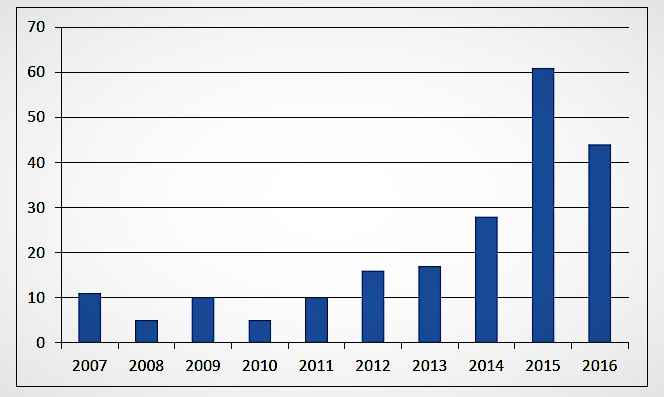Water supplies to 700,000 consumers not meeting public health standards
September 12th, 2017
Water supplies to over 700,000 consumers require improvements to meet public health standards, a new report from Ireland’s environmental watchdog has revealed.
The EPA’s Drinking Water Report 2016, published today, also indicates that Trihalomethanes (THMs), lead, and pesticides continue to be the main cause of concern for the quality of water in our public water supplies.
While Irish Water is tackling THMs and lead on a “national level”, the EPA says there is “no such consistent approach” to deal with pesticide contamination.
The national water utility company uses a regional approach to tackling pesticides; however, EPA investigations show that progress has not been adequate, identifying 16 supplies with pesticide exceedances.
In these cases, Irish Water has “not taken or identified adequate measures to return them to compliance”, according to the environmental watchdog.
The report also highlighted a reduction in the incidence of E. coli in public water supplies. While praising this achievement, the EPA’s Senior Drinking Water Inspector Darragh Page emphasised the challenge to reduce the levels of THM and pesticides across Ireland.
“The number of supplies reporting THM failures remains high, and a consistent national approach must be adopted to ensure that pesticides are prevented from entering our drinking water sources,” he added.
“We have also identified 25 supplies that require adequate treatment to prevent Cryptosporidium entering the water supply.”
Supplies on boil notices in September 2017 Source: EPA
The Green Party said that the report highlights a lack of urgency from the Government in addressing water quality and environmental issues.
Green Party Leader Eamon Ryan, TD said: “While Irish Water have made considerable progress on water issues in the last year, which is to be welcomed, the fact that 700,000 people in this country are at risk of contaminated water supplies is incredibly concerning.
“The Government have prioritised political expediency and refunding water charges, rather than putting the levels of funding required into addressing the serious deficiencies in our water and wastewater treatment services,” he added.
Pesticides
‘Pesticides’ includes a wide range of products, but in Ireland, herbicides pose the greatest threat to drinking water.
The most commonly found pesticide, detected in 37 samples, was MCPA (2-methyl-4-chlorophenoxyacetic acid), a powerful, selective, and widely used phenoxy herbicide.
MCPA is usually detected in the summer months and in early autumn as it is applied to grassland for ragwort, rush, and thistle control.
The report fines that Irish Water has ‘improved monitoring’ of public water supplies for pesticides in recent years, including a new monitoring programme of all public supplies for the 21 most common pesticides found in Irish waters.

Public water supplier with reported pesticide failures in 2016 Source: EPA
The EPA added, however, that “widespread” and “persistent” failure to meet the standard has emerged, with potential pesticide failures identified across 44 supplies in 2016.
Heading into 2017, the DWR found that 63 supplies serving over 900,000 people had open investigations due to failure to meet the pesticide standard.
The EPA said that resources available from the National Pesticide and Drinking Water Action Group (NPDWAG), which is led by the Department of Agriculture and meets quarterly, should be used “as much as possible” in developing activities in catchments.
The report also identifies the need for a National Pesticides Strategy, which it states is not only critical but requires cooperation from the various stakeholders in the affected catchments to address the unique challenges pesticide contamination causes.
Irish Water said that a strategy to address the issue of pesticides in drinking water on a national and local level will be published later this year.
Boil Water notices
The EPA also called for Irish Water to prioritise the elimination of long-term boil water notices by providing robust disinfection systems.
During 2016, 41 boil notices and 10 water restriction notices were in place in 16 counties affecting 84,348 people. At the end of 2016, 10 boil notices were in place affecting 5,654 people.
The largest supply affected by a boil notice or water restriction during 2016 was the Lough Mask supply in Co. Mayo, which serves 39,435 people. This boil notice was issued following the detection of Cryptosporidium, a parasite that is found in human or animal waste. If present in drinking water, it can cause persistent diarrhoea.
Monitoring of the parasite is not required by drinking water regulations, however, the EPA has produced guidance on Cryptosporidium monitoring and Irish Water must notify the EPA of any detections.
The EPA Drinking Water Report 2016 as well as the complete list of public water supplies currently on the Remedial Action List (RAL) – including details of the proposed remedial measures and associated time frames – is available on the EPA website.
[x_author title=”About the Author”]







